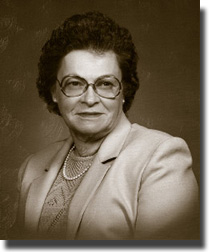Talking to patients came easily for nurse Josephine
Twilley, but recording their stories became serious business for her as director
of patient services.
![]() Only
a few years from retirement, she took on the newly created job of Patient
Representative. Before, she always tried to avoid conflict, but it became
part of her job as ombudsman.
Only
a few years from retirement, she took on the newly created job of Patient
Representative. Before, she always tried to avoid conflict, but it became
part of her job as ombudsman.
![]() "Usually
it was just a misunderstanding, a miscommunication," she remembers. "We
had so many people from out of town, we had people who couldn't even get on
an elevator and know what button to push."
"Usually
it was just a misunderstanding, a miscommunication," she remembers. "We
had so many people from out of town, we had people who couldn't even get on
an elevator and know what button to push."
![]() Thanks
to her, they had a voice. She made sure that patients' emotional needs were
understood as carefully as their medical ones."One of the big things
we did was track down false teeth. It's a small thing, but before you know
it, people would say we didn't care enough to help them find their teeth."
Thanks
to her, they had a voice. She made sure that patients' emotional needs were
understood as carefully as their medical ones."One of the big things
we did was track down false teeth. It's a small thing, but before you know
it, people would say we didn't care enough to help them find their teeth."
![]() "I
didn't want these patients to fall through the cracks," she says. "I
wanted them to be heard."
"I
didn't want these patients to fall through the cracks," she says. "I
wanted them to be heard."
![]() Sometimes,
it was lost clothing, watches or jewelry. Other times, if a patient needed
attention, she found an attendant. "There were a lot of little things
that we did," she says. "We were busy - it was 'Johnny-on-the-spot.'
"
Sometimes,
it was lost clothing, watches or jewelry. Other times, if a patient needed
attention, she found an attendant. "There were a lot of little things
that we did," she says. "We were busy - it was 'Johnny-on-the-spot.'
"
![]() Soon,
she was helping people prepare their living wills with the pastoral staff.
She also supported doctors when they asked the family of a dying patient to
donate organs.
Soon,
she was helping people prepare their living wills with the pastoral staff.
She also supported doctors when they asked the family of a dying patient to
donate organs.
![]() She
learned that kindness is often a patient's most critical need. Her gift for
easing tension - "major diplomacy," she calls it - earned her the
Pitt Memorial Foundation's Award in 1985. "You had to be a good listener,
that was the secret," she says. Her fledgling efforts ensured the development
of the Patient Representative Program at PCMH.
She
learned that kindness is often a patient's most critical need. Her gift for
easing tension - "major diplomacy," she calls it - earned her the
Pitt Memorial Foundation's Award in 1985. "You had to be a good listener,
that was the secret," she says. Her fledgling efforts ensured the development
of the Patient Representative Program at PCMH.

Josephine Twilley
The Brody School of Medicine at East Carolina University
600 Moye Boulevard
Greenville, North Carolina 27858-4354
P 252.744.2240 l F 252.744.2672